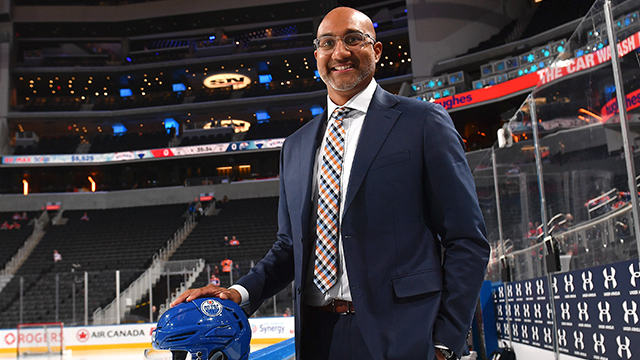
U of A expert and Edmonton Oilers physician weighs in on the use of caffeine as pre-game routine.
If you watch televised sports, you've likely seen images of the athletes arriving at the arena; navigating their way to dressing rooms, suited-up, headphones on, venti Starbucks coffee in hand. But would you consider that cup of Joe-something that a lot of us use to kick-start our day-to be an important part of pre-game preparations or even a performance enhancer?
As a recent ESPN article illustrates, even for pro athletes like the Portland Trail Blazers, coffee isn't only a familiar habit and routine, it can even be a part of the pre-game ritual and an element of reaching peak performance.
Competitive sport at any level requires an effective pre-game preparation plan. Should they follow the star athletes' routine? We spoke with Dhiren Naidu, associate professor in the Faculty of Medicine & Dentistry's Division of Physical Medicine and Rehabilitation, and the lead team physician for the Edmonton Oilers, Edmonton Eskimos and Golden Bears Football, regarding the use of coffee and other performance-enhancing stimulants as a part of preparation for physical activity.
In the following Q & A, Naidu provides some interesting insights into the importance of a holistic approach to pre-activity preparation, all of which can be clouded by marketing, social pressure and an incomplete understanding of how various elements affect our systems.
Q: Can coffee be considered a performance-enhancing beverage, and what should individuals know about the ways in which coffee affects our systems?
Coffee isn't new as a stimulant or performance-enhancer, millions of people use it every morning to start their day, athletes included. For example, Hockey Night in Canada frequently shows players walking into the arena with a cup in hand.
Existing research does show that endorphin levels, musculoskeletal function and mental alertness are improved by coffee consumption at certain levels. Research shows that ingesting 3-6 mg of caffeine for every kilogram a person weighs prior to exercise shows some performance enhancement. Equating that to Starbucks, for an 82 kg (180 lb) athlete, that's roughly a Grande (medium to large) coffee. For the average individual, two medium-sized coffees would be a reasonable daily maximum. However, high or habitual coffee consumption can be a vicious cycle, affecting sleep patterns, and the body can become acclimatized to its effects. High use can also lead to serious side-effects like arrhythmia, increased heart rate and heightened blood pressure.
Q: When one thinks of performance-enhancing beverages, one might think of Red Bull, Monster Energy or the like. How does coffee compare to those beverages? Would you recommend energy drinks before or during competition?
There are several differences between coffee and the prominent energy drinks on the market; the caffeine levels are similar, but energy drinks are typically high in calories, have added sugars, amino acids, herbs and other additives, the combined effect of which is not well understood. Some drinks also have artificial elements that may affect people in different ways.
So far as using energy drinks for sport-performance, I do not recommend it. Typically, athletes will have a daily routine that may already include coffee, a larger pre-game meal earlier in the day as opposed to balanced meals throughout the day, as well as the physiological effects of performance anxiety. To add either coffee or an energy drink to the system adds additional high-intensity materials, and also means that one is drinking less pure water. High sugar levels act as a diuretic, which can exacerbate dehydration and result in a decrease in performance and reaction times.
That being said, coffee is often used to help regulate wakefulness by individuals experiencing challenges to their sleep schedule, including athletes travelling across time zones, as highlighted in the ESPN article regarding the Trailblazers.
Q: What about younger athletes who may see these drinks, including coffee, as being part of a good routine?
Neither energy drinks, nor coffee, should be seen as a supplement for youth, unless recommended by someone with medical training. Overall diet can be difficult to monitor among youths, and if there's already usage of coffee, high sugar intake, etc. in daily habits, the negative effects may be compounded by pre-game supplements. There may also be external social pressure for young people to take part in habits like this; if teammates or role models are using them, or potential health impacts aren't understood, they may not be seen as having negative aspects, which is concerning.
Q: What do you recommend for those looking to gain a boost in their performance, while avoiding the potential negative aspects of supplements like energy drinks or habitual coffee use?
Quality sleep is very important, as are proper diet, staying hydrated, and a solid pre-game warm up. When one warms up properly, the heart rate rises and other systems are readied to perform at a higher level. So far as things that can be taken to aid in overall performance health, a vitamin D supplement or multivitamin may help those who train primarily indoors, but maintaining quality sleep patterns and a healthy diet will have substantial benefits.